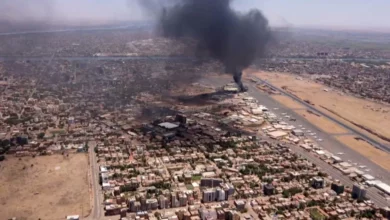
Egyptian President Abdel Fattah al-Sisi on Sunday received Ambassador Jean Léon Ngandu Ilunga, the Special Envoy of the President of Congo and Permanent Representative of the Democratic Republic of the Congo to the African Union.
Egyptian Foreign Minister Sameh Shoukry, and Chargé d’Affairs of the Democratic Republic of the Congo Embassy in Cairo attended the meeting.
The Egyptian presidential spokesperson Bassam Rady said that Sisi praised the tireless efforts of the Democratic Republic of the Congo during its current presidency of the African Union.
Egypt will continue to support the DR Congo in assuming the important responsibility of leading joint African action during the current year, as well as fostering long-standing ties between both nations which represent a rolemodel for joint cooperation and coordination within the African continent.
The meeting discussed several topics on issues of common interest within Africa, which the African Union is currently prioritizing on its agenda.
The Congolese ambassador expressed his deep appreciation for the tireless support and assistance provided by Egypt to the Democratic Republic of the Congo during its current presidency of the African Union.
Egypt has broad experience in multilateral work on the African continent, Sisi said, and further praised the strong relations between the Congo and Egypt.
Congo is the current president of the African Union, and coordinates negotiations between Egypt, Sudan and Ethiopia over the Grand Ethiopian Renaissance Dam.
The UN Security Council issued a statement in mid-September on the GERD dispute encouraging Egypt, Ethiopia and Sudan to resume negotiations, under the President of the African Union, to finalize a binding legal agreement on filling and operating the dam.
Negotiations over the dam between Egypt, Ethiopia, and Sudan have stalled for years, with the three parties ultimately failing to reach any agreements.
The disputed dam is the largest hydroelectric project in Africa, with a cost of more than four billion dollars.
Egypt and Sudan say they want a legally binding agreement, while Ethiopia says any pact should be advisory.
Egypt and Sudan consider the dam a threat to their vital water supplies, while Ethiopia considers it essential for development and doubling its electricity production.
The downstream nations fear possible blows to water facilities, agricultural land, and overall availability of Nile water.
They presented the GERD issue at a UN Security Council hearing in July in hopes of bringing more international players into the negotiation process.
Following the hearing, the Security Council issued a statement encouraging the three countries to resume negotiations under the auspices of the African Union, and to reach an agreement within a set amount of time. It also warned each country against unilateral measures.




